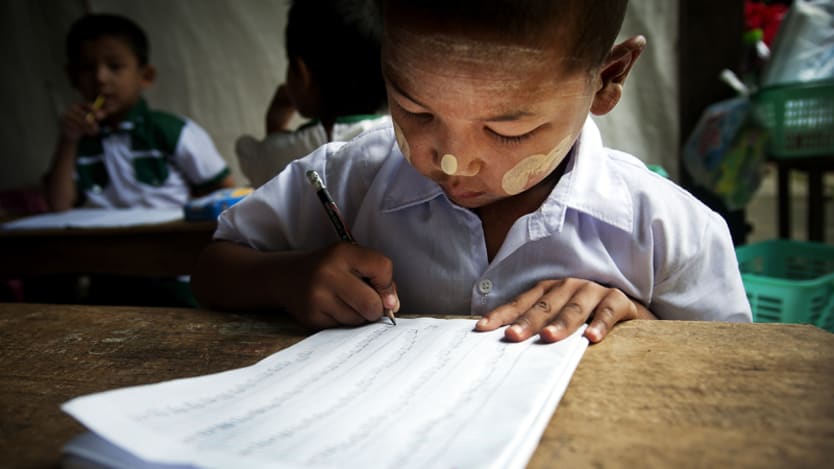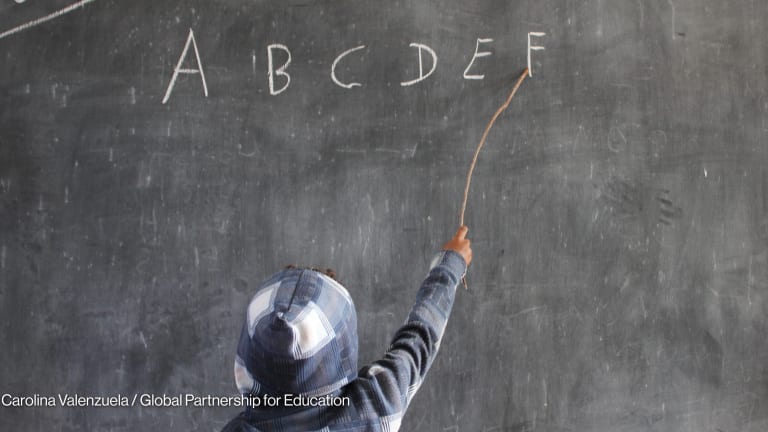
During its long history of political upheaval and conflict, Myanmar didn’t prioritize education — and its effects are still being felt today. In the 2016 Human Development Report, Myanmar ranked 150th among 187 countries for expected years of schooling. Linked to education are ongoing challenges of child labor and poor economic prospects, particularly in rural and remote areas.
Slowly, things are shifting. When Aung San Suu Kyi’s National League for Democracy Party won the elections in 2015, new leaders prioritized education. The National Education Strategic Plan was established a year later, with targets to improve access and quality of education under a national standard by 2021.
Three high-level strategies are driving the new plan: Universal access to free basic education; compulsory and inclusive education; and improved quality of education through a national school-based quality assurance system.
See more related topics:
► Climate change is undermining sustainable development in Myanmar. Here is what can be done about it.
► Private sector provides opportunity to improve Myanmar's health outcomes
► Q&A: Outgoing ICRC Myanmar head on humanitarian response in protracted conflict
► Q&A: Julia Gillard on raising funds for the Global Partnership for Education
The work ahead is great, according to recent research by ChildFund Australia. Teachers and students are at the center of a complex system consisting of policymakers, bureaucrats, donors, civil society and the communities in which they reside, according to the report Education for all: Bridging the knowledge gap in Myanmar.
ChildFund identified the cost and poor quality of education as the top factors undermining the right of children to quality education. Widespread acceptance of child labor, particularly to support low income families, is another barrier that needs to be urgently addressed. Devex spoke to Richard Geeves, senior education adviser for ChildFund Australia, about how to move forward. Our conversation follows, edited for length and clarity.
What do you see as the role of ChildFund in supporting quality education in Myanmar?
ChildFund provides support to education models that offer prospects for increasing access to education or improving its quality. We focus in particular on improving educational outcomes for poor and disadvantaged children and families. ChildFund’s projects in Myanmar are implemented in partnership with local civil society organizations, including the Monastic Education Development Group and Girl Determined.
With the Monastic Education Development Group, ChildFund is working to improve school infrastructure, including the construction of new classrooms and libraries, and implement teacher training programs to improve the education outcomes for students. Monastic schools offer free education and reach children from poor and marginalized communities.
ChildFund’s partnership with Girl Determined focuses on the implementation of a leadership and life-skills program for girls and young women, many of whom have not been able to complete their education due to household poverty.
By working with local partners, ChildFund is able to support positive government initiatives while also holding the government to account when it fails to deliver the rights for which it is responsible, including education, participation and protection.
There are a range of education challenges that require funding in Myanmar. How do you prioritize them and what ranks highest among challenges?
Education is complex, but access and participation must come first. This includes providing children with a place where they can come and learn, having skilled educators who can manage daily school routines in a professional manner and addressing issues of affordability, particularly for children from low income households.
The second challenge to address is the need for simple, relevant learning programs, taught using appropriate, child-friendly methodologies.
And thirdly, ensuring schools have teachers with enthusiasm, skills and knowledge, and who have access to educational resources.
What are some of the strategies to tackle the access issue?
The most important contribution in the last 10 to 20 years has been the emergence of low or no-cost alternatives to state schools, such as monastic and community schools.
With the recent political liberalization, there has come a recognition that the state is responsible to provide education to all — symbolized by the publication of the National Education Strategic Plan as well as the prospect of greatly increased funding for education and, subsequently, extending its reach into new areas both geographic and demographic.
Through the country’s high rate of economic growth, poverty is being reduced as a barrier to education in remote communities. But — and it’s a big but — very large sections of the population are still affected by extreme poverty.
What can be done to prevent children in Myanmar leaving school early to financially help or support their families?
1 in 4 children miss out on childhood, according to a new ranking
Save the Children hopes that a new index on childhood experiences around the world will resonate with the U.S. public and help change attitudes to foreign aid. Devex spoke to its authors to find out more.
Even if new laws are passed, public adherence to them and their enforcement are separate issues, and child labour is very entrenched. I saw a lot of very young children working the streets when I was in Yangon three weeks back. Public awareness and education on the negative impact that child labour has to children’s development, and the economy more broadly, must run alongside legislative enforcement.
A lot of current education programs from donors focus on innovation. Is this appropriate in Myanmar or is another approach needed?
Both infrastructure and innovation are probably needed. There is a strong tradition of valuing education in Myanmar, from both Buddhist and colonial and post-colonial times, and this will no doubt continue.
But there is also an awareness, particularly amongst youth, of the need to catch up with regional neighbors and move into the 21st century.
Who are the advocates in the communities for quality education? How long do you expect before we see real change?
Many voices are needed in the call for improvements to education. This should include parents, children, youth, teachers and education leaders, local government officials and elected representatives.
If other countries in the region are a guide, it should take a generation for this change to occur. Myanmar can develop more quickly, though, due to its open political structure, rapid economic development as well as its natural resources and potential for tourism.
Read more international development news online, and subscribe to The Development Newswire to receive the latest from the world’s leading donors and decision-makers — emailed to you free every business day.








